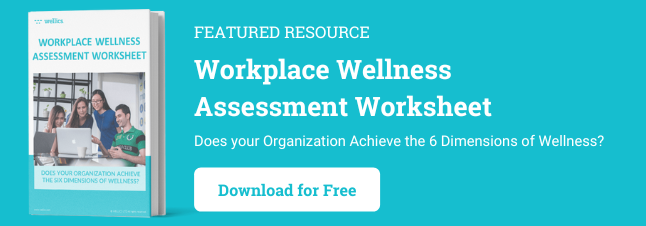April is Autism Acceptance Month—a time when advocates work to increase understanding and acceptance of autism while improving community support so that those with autism can thrive in all areas of life, including at work.
According to research published in the British Medical Journal, 15% to 20% of the workforce is considered neurodivergent, which includes those on the autism spectrum. Yet, in the U.S., an estimated 85% of people with autism are unemployed. Given the staggering unemployment gap between people with autism and the general population, organizations need to reflect on how to expand recruitment and retention strategies, as well as employee wellness programs, to include the needs of neurodivergent workers.
Follow this guide to supporting neurodiversity in the workplace to learn more about neurodivergent types, as well as the benefits of hiring for neurodiversity and making autism workplace accommodations that can close the unemployment gap.
About Neurodiversity
Neurodiversity refers to the idea that there are many different ways of thinking, learning, behaving, and processing information due to how individual brains naturally develop.
Neurotypical brain development refers to people with brains that developed along with a more common pattern, while neurodivergent brains are those exhibiting developmental variations.
Some of the common types of neurodivergence include:
- Autism spectrum disorder (ASD), including conditions like Asperger’s syndrome
- Attention deficit hyperactivity disorder (ADHD)
- Learning disabilities, like dyslexia or dyscalculia
- Developmental coordination disorders, like dyspraxia
People with neurodivergent thinking and behavior often deal with social settings or everyday responsibilities differently than neurotypical individuals. For example, neurodivergent people may cope with workplace stress differently and may have unique mental health or physical well-being needs.
Despite these differences, neurodivergent thinkers often have unique cognitive skills to contribute, provided they’re placed in the right setting where they can apply their talents.
By encouraging neurodiversity at work, organizations can become stronger and function better when they embrace neurodivergence as a strength rather than a barrier.
What Is Neurodiversity Training?
Thanks to increased awareness, it’s becoming more common to see neurodivergence as normal brain variations rather than as a disability. With this perspective, companies are seeking to learn better strategies and approaches to accommodate neurodivergent workers and maximize their success and contribution to an organization.
Neurodiversity training is often led by neurodivergent people or people with expertise in researching and working with people with ASD or ADHD.
With neurodiversity training, companies learn how to successfully accommodate neurodivergent workers, including how to:
- Recruit, onboard, and retain neurodivergent workers
- Establish tailored job roles and responsibilities
- Optimize successful communication among co-workers and management
- Maintain employee engagement, motivation, and satisfaction
Neurodivergent workers are often attracted to industries and fields where their cognitive differences can best be put to use, including data analytics, creative design, and technology development. Companies within these industries can greatly benefit from neurodiversity training so they can better recruit and retain talent among these workers.
Benefits of Neurodiversity Hiring
Today, many organizations view neurodiversity as a competitive advantage, providing organizations with highly specialized, productive, and creative workers who can take their business operations or product development strategies to the next level.
Below are four ways that neurodiversity in the workplace can benefit organizations.
1. More Creativity
Creativity refers to the ability to generate new ideas or possibilities. Neurodivergent people are often considered creative thinkers, meaning they’re not constrained by rules about how things ought to be done. They often resist commonly accepted methods and instead find novel ways of doing things.
Creative thinkers see their environment or job duties beyond the current limits, offering out-of-the-box alternatives to the way organizations typically operate. Companies that embrace the unconventional perspectives of neurodivergent thinkers can position themselves as having a unique competitive advantage within their workforce.
2. Better Innovation
Certain types of neurological differences enhance a person’s ability to recognize patterns. When applied in the workplace, these pattern-recognition abilities allow neurodivergent employees to identify critical issues, ultimately providing valuable new insight. Companies then become more innovative, adjusting their practices based on the new perspectives they’ve uncovered.
As excellent problem-solvers, neurodivergent people often thrive when tasked with coming up with specific solutions. Whether it’s implementing a new cybersecurity protocol or finding better ways to verify quality assurance, companies can put neurodivergent employees to work on resolving complex issues.
3. Improved Productivity
Neurodivergent thinking gives workers the ability to be highly productive and effective, finding the best and most strategic ways to accomplish more work in less time. For example, Australia’s Department of Human Services, in conjunction with Hewlett Packard, found that neurodiverse teams of software testers were 30% more productive than teams with non-neurodiverse employees.
Not only can neurodivergent thinkers be strong producers, but they can also generate high-quality work thanks to heightened attention to detail, often bordering on perfectionism. Neurodivergent thinkers thrive when they work independently, allowing them to produce their best work unencumbered by environmental constraints.
4. Specialized Skills
Neurodivergent people are often logical, analytical thinkers who become highly committed to perfecting whatever skill they’re interested in. Neurodivergent thinking allows workers to focus for extended periods on a specific task of intrigue, leading them to hone their skills over time, eventually achieving mastery.
This level of concentration and commitment, combined with a natural resilience and determination, makes neurodivergent workers some of the most highly skilled employees in specialized areas. Often these types of thinkers are willing to put in extra work to study and research their skills to further improve their proficiency.
Neurodiversity and Workplace Well-Being
Embracing neurodiversity in the workplace creates a more successful and fulfilling work environment for all. By accommodating neurodivergent workers, organizations can develop a competitive advantage that puts them in a unique position to thrive.
When looking for ways to accommodate neurodivergent employees, consider how workplace wellness programs can be tailored to the needs of the individual. Supporting neurodivergent workers with mental health resources, like stress management and self-care, can drive increased employee engagement and satisfaction.
With the Wellics employee wellness platform, you can set metrics, such as productivity or engagement, and monitor the results among your employees. Leverage the power of our Wellness Index to discover how fostering neurodiversity in the workplace leads to improvements in the health, well-being, and overall productivity of your team — including your most creative and neurodivergent employees.
Explore how the Wellics workplace wellness platform can work for your team.
Originally published March 31, 2022 - 8:35 AM, updated September 3, 2024
Sources
- https://www.ncbi.nlm.nih.gov/pmc/articles/PMC7732033/
- https://www2.deloitte.com/us/en/insights/topics/talent/neurodiversity-in-the-workplace.html
- https://www.bdadyslexia.org.uk/dyslexia/neurodiversity-and-co-occurring-differences/what-is-neurodiversity
- https://hbr.org/2017/05/neurodiversity-as-a-competitive-advantage










